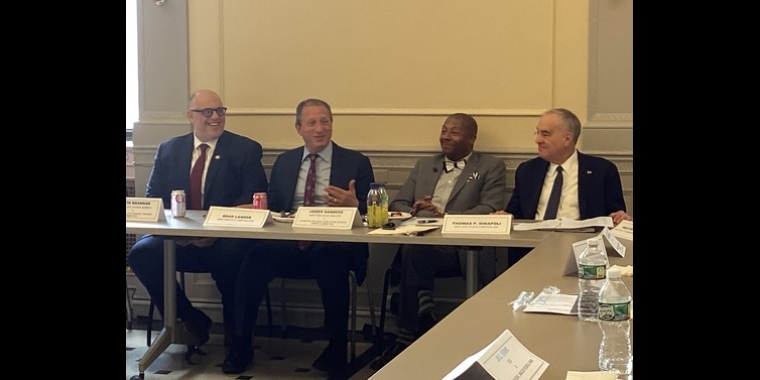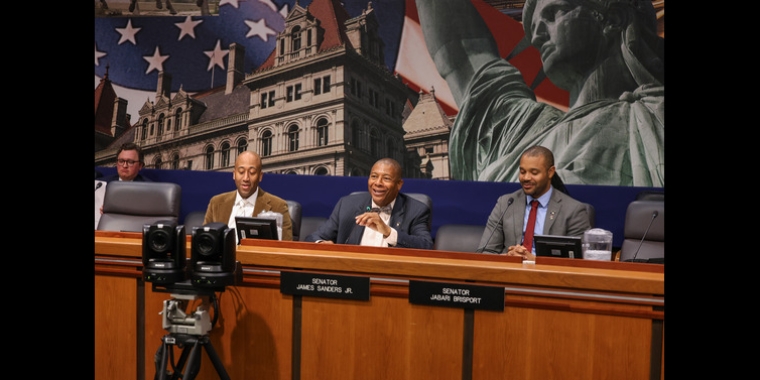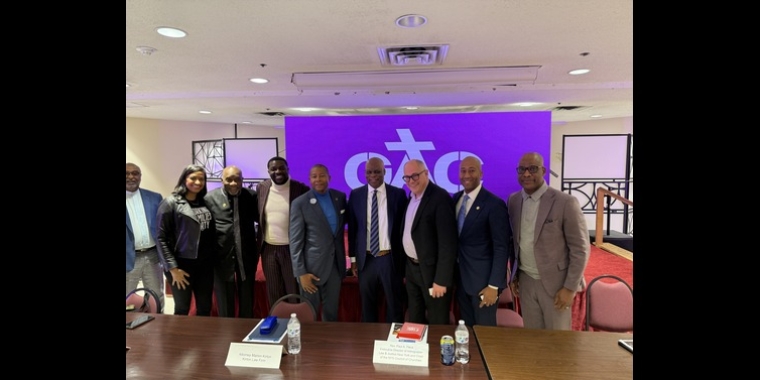
New York State Senator James Sanders Jr. NYC Comptroller Brad Lander, and Council Member Justin Brannan Host Historic Luncheon Meeting with NYS Comptroller Thomas DiNapoli, and Others to Promote Minority Depository Institutions (MDIs)
Olalekan Omodunbi
April 24, 2024
-
ISSUE:
- Public Banking
- Banks
- Banks Committee
- ACCESS TO BANKING AND FINANCIAL SERVICES
- Underserved Communities

(New York, NY) – Today, Senator James Sanders Jr., Chair of the New York State Senate Banks Committee, New York City Comptroller Brad Lander, and NYC Council Member Justin Brannan, Chair of the City Council Finance Committee, hosted an historic luncheon meeting with NYS Comptroller Thomas DiNapoli, NYC Finance Commissioner Preston Niblack, various representatives of minority depository institutions (MDIs) and others to discuss the relationship of minority banks in New York State and financial institutions, particularly focusing on the lack of accessibility to City and State capital.
The luncheon meeting was held at the Office of New York City Comptroller Brad Lander, Comptroller’s Boardroom, Room 530, One Centre Street, New York, NY 10007. The luncheon provided a platform for open dialogue and collaboration among key stakeholders, including representatives from minority banks active within New York State, government officials, and community leaders. The objective of this luncheon was to explore opportunities and ways to enhance the financial support and vital resources necessary for the growth and sustainability of these minority banks across New York State.
Extensive research demonstrates that minority-owned banks play a pivotal role in addressing the unique needs of minority communities. Their deep understanding of cultural nuances and specific financial challenges faced by these communities allows them to provide tailored financial products, personalized guidance, and culturally sensitive services often lacking in larger banking institutions. This commitment to customer-centric solutions fosters economic empowerment, promotes financial inclusion, and drives business development within underserved communities.
Senator James Sanders Jr. said, “Today, a major step was made to advance equity in New York’s financial institutions by bringing together key stakeholders from government and minority banking and credit institutions to discuss what should be done going forward to provide equal opportunities. I am proud to see our commitment to financial inclusion and the empowerment of diverse communities reflected in today's discussions. Let us continue to collaborate, innovate, and ensure that our banking system works for all communities, including communities of color. I thank NY State Comptroller Tom DiNapoli and NYC Comptroller Brad Lander especially for participating, and all the attendees.”
New York State Comptroller Thomas P. DiNapoli said, “Community prosperity requires access to banking services, capital and credit. I thank Senator James Sanders Jr., New York City Comptroller Brad Lander, Councilman Justin Brannan and all the attendees for their shared commitment to advancing equitable access to capital for minority communities.”
New York City Comptroller Brad Lander said, “As far too many New Yorkers remain unbanked, Minority Depository Institutions are playing a crucial role in providing access to affordable and high-quality banking services but they cannot do it alone. I am grateful to Senator Sanders for convening this timely conversation to discuss ways we can address the widening racial wealth gap by ensuring the sustainability and growth of diverse-owned banks. I am proud of the work that my office is already doing to ensure that our City’s pension assets are managed by investment firms that reflect the benefits of diversity and I’m excited to build on that work with the partners who joined this conversation today. Diversity has proven to correlate with improved investment outcomes and is a key driver of performance.”
City Council Finance Chair Justin Brannan said, "How our cities and states do business reflect the values of the residents. Minority depository institutions can provide economic security for disenfranchised communities underserved by noncommunity financial institutions. But they need our support. In a city and state diverse as ours, minority banks are essential. I want to thank my friend Senator James Sanders for convening this important stakeholder discussion. This is the start of something big."
Preston Niblack, Commissioner of the NYC Department of Finance, said, “Senator Sanders has done an important service in bringing together representatives of minority banking and financial institutions with State and City policymakers to explore how we can increase MBI participation with state and local government. As a statutory member of the City’s Banking Commission, I wholeheartedly share the Senator’s goal and look forward to working with our partners to identify how we can increase opportunity for minority-owned financial institutions.”
Nicole Elam, Esq, CEO & President, National Bankers Association said, “We were honored to join this critical meeting attended by minority depository institutions including Ponce Bank, Industrial Bank, Carver Federal Savings Bank and Abacus Federal Saving Bank and hosted by Chair of the NY State Senate Banks Committee James Sanders Jr.,” shares Nicole Elam, President and CEO of the National Bankers Association. “Our hope is to drive more government deposits to minority depository institutions that serve underbanked communities and ensure equitable opportunity for procurement of banking services for these vital banks. We look forward to continuing the conversation with leadership.”
John Witowski, CEO & President, Independent Banks of New York State said, IBANYS is pleased to work with Senator Sanders and other leaders in NYS to help find solutions for the unbanked and underbanked.
William J. Mellin, President & CEO, New York Credit Union Association said, “It was a privilege to be included in the conversation surrounding minority depository institutions. I thank Senator Sanders, Comptroller Lander, and Council Member Brannan for their consideration of credit unions in New York. Credit unions remain committed to providing equal opportunities to all members throughout the state and will continue to explore all options dedicated to enhancing and improving financial support initiatives and access to resources for minority populations.”
Jill Sung, President & CEO, Abacus Federal Bank said, “Abacus Bank is honored to be included in this discussion of finding ways for minority depository institutions to work with the City and State for the betterment of all communities in New York. We thank Senator Sanders, NYS Comptroller DiNapoli, NYC Comptroller Lander and NYC Council Member Justin Brannan for their dedication to finding ways to empower MDIs to achieve their missions. We look forward to being part of real solutions to overcome challenges our communities have faced historically and continue to face today.”
Carlos Naudon, President and CEO of Ponce Bank, MDI, CDFI said, “Amid all the talk about “systemically important” banks these days it’s often forgotten that community banks and minority depository institutions, with their ability to place funds far more effectively into the hands of people and businesses for whom it will have the MOST widespread impact, are more than just important, they are systemically critical.”
Other attendees included Shawn Phillips, Head of External Engagement, Federal Reserve Bank of NY; Independent Bankers Association of New York State President John Witkowski; National Bankers Association President Nicole Elam; New York Mortgage Bankers Association President Jeff Pinard; New York State Credit Union Association William Mellin; Lewis P. Jones III, Chairman, Carver Bancorp; President & CEO Carlos P. Naudon, Ponce Bank; Vice President Kim Ramos, Director of Government Affairs, Ponce Bank; Jill Sung, President & CEO, Abacus Federal Bank; Lloyd Doaman, Head of Carver Community Development Corp, Carver Federal Savings Bank; and Willie Blalock, Senior Vice President, Industrial Bank.
This landmark luncheon marked a significant first step in exploring the potential of state and municipal deposits within minority-owned banks. Participants across sectors expressed enthusiasm for the initiative, recognizing its potential to drive economic empowerment within underserved communities. The resounding consensus among attendees was that this collaboration represents a promising start, with a shared commitment to continued dialogue and action to turn this impactful idea into a reality.
###
Share this Article or Press Release
Newsroom
Go to Newsroom


